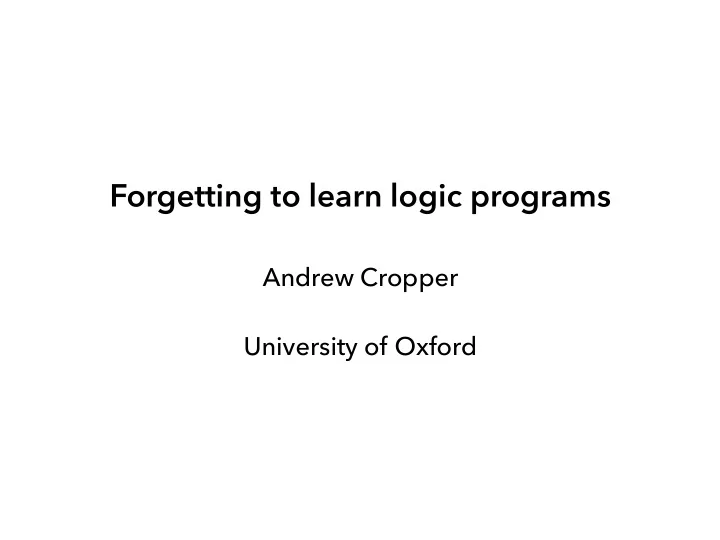

Forgetting to learn logic programs Andrew Cropper University of Oxford
Program induction/synthesis Examples Learner Background knowledge
Program induction/synthesis Examples Learner Computer program Background knowledge
Examples input output dog g sheep p chicken ?
Examples Background knowledge head input output tail dog g empty sheep p chicken ?
Examples Background knowledge head input output tail dog g empty sheep p chicken ? def f(a): t = tail(a) if empty(t): return head(a) return f(t)
Examples Background knowledge head input output tail dog g empty sheep p chicken n def f(a): t = tail(a) if empty(t): return head(a) return f(t)
Examples Background knowledge head input output tail dog g empty sheep p chicken n f(A,B):-tail(A,C),empty(C),head(A,B). f(A,B):-tail(A,C),f(C,B).
Background knowledge defines the hypothesis space
Where does background knowledge come from?
Hand-crafted rules [almost every approach]
Unsupervised learning ALPS [Duman č i ć et al. IJCAI 2019] Playgol [Cropper. IJCAI 2019]
Supervised multi-task learning Use knowledge gained from solving one problem to help solve a different problem Metabias [Lin et al. ECAI 2014] Dreamcoder [Ellis et al. NIPS 2018]
Why does it work? We increase branching but reduce depth
Problem: big branching factor
Idea Forget things
ILP problem Given: • background knowledge B • positive examples E+ • negative examples E-
ILP problem Return: A hypothesis H that with B entails E+ and not E+
Forgetting problem Given background knowledge B Return B’ ⊂ B from which you can still learn the target hypothesis
Why? Reduce branching and sample complexity
How? Forgetgol , a multi-task ILP system based on Metagol, which takes a forgetting function as input
Forgetgol Continually expands and shrinks its hypothesis space
Syntactical forgetting (lossless) 1. Unfold each induced clause to remove invented predicate symbols 2. Check whether a syntactically duplicate clause already exists
Statistical forgetting Assigns a cost to each clause based on: 1. How difficult it was to learn 2. How likely it is to be reused
Does it work? Q. Can forgetting improve learning performance?
We compare: Metabias : remember everything Metagol: remember nothing Forgetgol syn : syntactical forgetting Forgetgol stat : statistical forgetting
Robot planning
What happened? Metabias rarely induces a program with more than two clauses because of program reuse
Lego building
What happened? Less reuse (and greater search depth) so forgetting has more effect
Conclusions Forgetting can improve learning performance when given >10,000 tasks, but, surprisingly, not by much
Limitations and future work Better forgetting methods Larger and more diverse datasets Concept shift Recency Other program induction systems
Recommend
More recommend